Timeline for Futures Family Planning Clinic closure: 'There's still plenty to say here.'
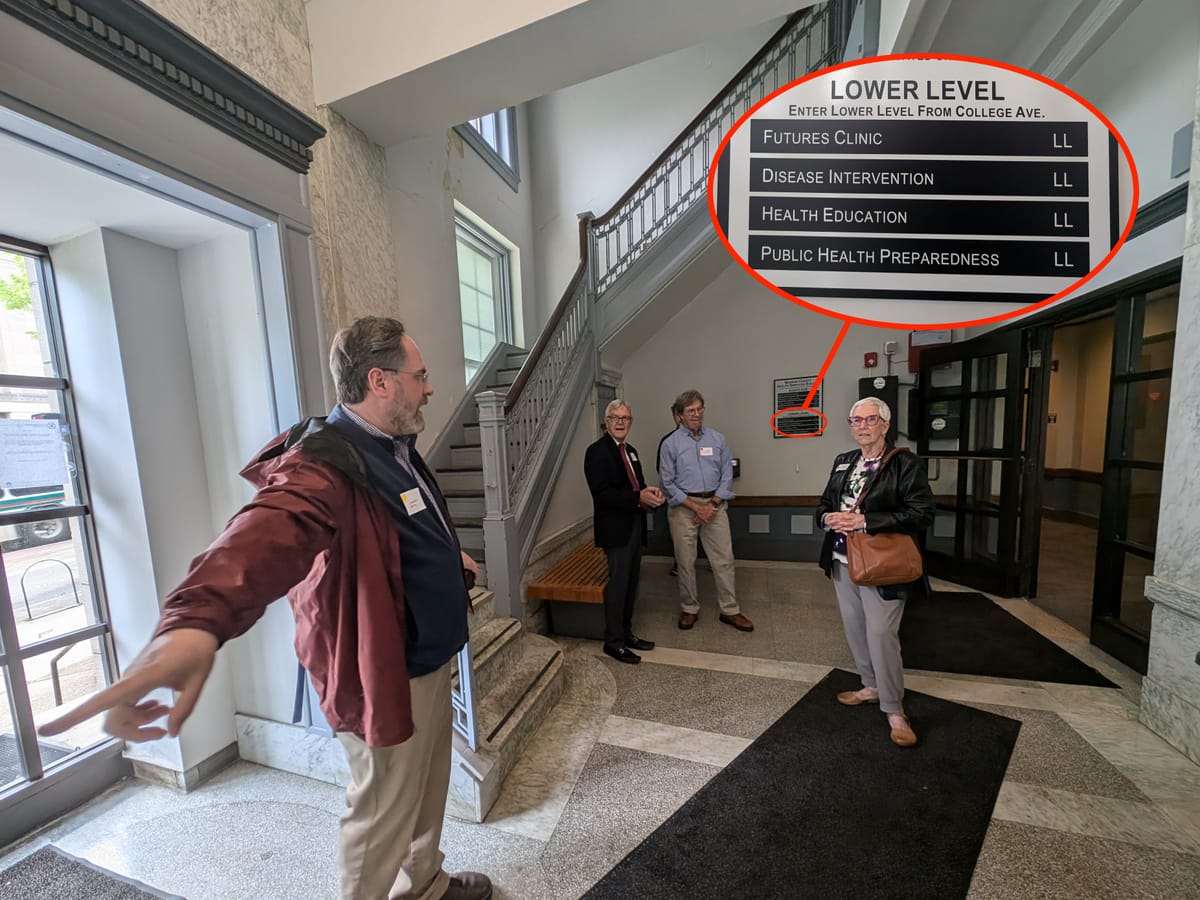

On Friday afternoon, Monroe County's health department hosted an open house at its location at 7th Street and College Avenue, kitty corner from the jail in downtown Bloomington. The former post office, which was built in 1912, serves as the county's health services building.
The event allowed county councilors and county commissioners who attended, to visit with health department staff to talk about their jobs—in vital records, environmental services, food inspection, disease prevention, emergency preparedness, and behavioral health, among other responsibilities.
After the self-guided tour of the building, current health board president Dawne (Aurora) DiOrio gave a slide deck presentation that featured the board's current priorities and accomplishments of the department over the last year.
Attending the open house were county councilors David Henry, Liz Feitl, and Jennifer Crossley, as well as county commissioners Julie Thomas and Jody Madeira.
Lurking beneath the surface was an issue that got an oblique mention after DiOrio's presentation, from board member Stephen Pritchard. He started off by saying, "Today, as I was going through the department…two separate areas pulled me aside and said: 'You know, we just want to let you know, we're fine. Everything is great.'"
Pritchard continued, "Morale is great, despite some of the things that you might read in the paper." He added, "But you know, basically, that's one single issue that keeps rearing its ugly head. …The department has excellent morale right now. Lori is doing a great job." Lori Kelley is the county's health administrator.
The "ugly head" issue is the closing of the Future's Family Planning Clinic, a name that is still written on the building wall. The building directory guides visitors to the lower level for the Futures Clinic, even though the clinic closed at the end of August last year.
The permanent closure of the Futures Clinic came after the board of health voted to announce a 30-day closure of the clinic, terminating its last remaining employee, pending a decision from Indiana Family Health Council (IFHC) about continuation of the clinic's Title X grant. IFHC ended the grant to Futures Clinic, and in February this year, IFHC restarted a bricks and mortar clinic to replace the services that Futures Clinic previously provided.
Most recently, issues connected with the clinic's closing were aired out during public commentary at the board's meeting on the Thursday before last (April 17), and to some extent at the most recent county council meeting, this past Tuesday (April 22).
Oct. 10, 2024 meeting notes
At the April 17 board of health meeting, county councilor David Henry called for disclosure of additional information surrounding the clinic closure saying, "There are documents that have been redacted that should perhaps shed more light on what we're hearing here…" Henry said, "It is not lost on me that a wound undressed will fester, and I gotta say I'd like to move forward as a community on this issue. I think we can do that together if we finally see some of the additional notes come to light."
Through a formal records request under Indiana's Access to Public Records Act, The B Square has obtained some notes from an Oct. 10, 2024 meeting that amount to a kind of after action review on the closure of the Futures Clinic. The notes indicate the meeting lasted 95 minutes. It's not clear who took the notes. Names have been replaced with Emp. 1, Emp. 2, Emp. 3, etc., but for people familiar with the context, the people would be identifiable. It is not clear that in each case where the substitution "Emp. X" has been made for a name, that it's the same name each time.
On the whole, the abbreviated notetaking style lends limited additional clarity, and in some cases creates a mystery to solve. The publication of the raw notes would be problematic, because they reflect speculation about former employees, or critical assessments of employees. The B Square would consider publication of the raw notes to be unfair to those employees, because individuals could potentially be identified who would have no chance for rebuttal. The same records request can be made by any person.
Listed as attendees of the Oct. 10, 2024 meeting are: Julie Thomas (county commissioner), Lori Kelley (county health administrator), Elizabeth "E" Sensenstein (Monroe County HR), Stephen Pritchard (board of health), Sarah Ryterband (board of health), Dawne (Aurora) DiOrio (board of health), Trent Deckard (county councilor), John VanderZee (CJAM moderator).
Where is the timeline?
In the raw notes, a mention of an additional document stands out: "Time line passed out." The B Square has made an additional records request for the timeline.
Drawing on its own reporting, the raw meeting notes, and the efforts of former clinic LPN Christine Brackenhoff, The B Square has built a timeline with links to sources, which include recordings of public meetings, and copies of email exchanges produced by Monroe County government in response to records requests by The B Square and Brackenhoff.
Some of the threads that emerge in the timeline include the turnover at the level of health administrator and higher—board members and the health officer.
Another theme that emerges is the idea that the challenges faced by the Futures Clinic were not shared with elected officials or Indiana Family Health Council (IFHC), the source of the clinic's Title X funding—or at least not in a way that made the crisis apparent to them so that it prompted action. Title X is a federally funded program that provides grants for family planning and related preventive health services, primarily for low-income people.
A third pattern that emerges is formed by the efforts that health administrator Lori Kelley made, to tap the efforts of clinical employees at Futures, to make up for the fact that there was a months-long vacancy in the clinic manager position.
Finally, there's an idea discernible in the timeline where the Futures Clinic appears to be treated as an underperforming work unit, that was not hitting its numbers, and was in some sense a burden to the health department, that could be carried better by some other entity besides county government.
Timeline: Leadership turnover
Turnover in the positions of health administrator and health officer, after people with long tenure in those positions resigned, could have contributed to the lack of stability in the health department generally.
The biggest leadership change that stands out on the timeline is the retirement of Penny Caudill as Monroe County health administrator almost three years ago in mid-July 2022. That's when Lori Kelley began her role as the health administrator, which supervises the Futures Clinic manager. The raw notes from the Oct. 10, 2024 meeting seem to indicate that board member Stephen Pritchard said that the clinic's decline started when Caudill retired.
The Futures Clinic appears to have gone without a clinic manager for at least a couple of months, starting in October 2022, when Chris Husted left. At last Thursday's (April 17) board meeting, former clinic manager Chris Husted stated during public commentary time: "You may recognize me as the former clinic manager for Futures from January of 2015 to October of 2022. ... One of the major reasons that I left is, frankly, due to Lori's leadership or lack thereof."
In the organizational structure of the health department, it's the board of health who hires the health officer, who hires the health administrator. Thomas Sharp started his service as Monroe County's health officer in 1976, but resigned two years ago at the end of April 2023. Sharp's replacement, Clark Brittain, served from May 2023 until the end of 2024. Sarah Ryterband, who was serving on the board of health at the time, was then hired as health officer to replace Brittain.
At the mid-December meeting when Brittain's resignation was announced, board member Stephen Pritchard said that Brittain likely did not completely grasp what would be expected of him as health officer, in part because it had not been made explicit. Pritchard took responsibility for that, saying, "We didn't spell out in detail exactly what we needed him to do." Still, Pritchard said that Brittain had "very, very graciously continued in the job—even though he was being pulled back towards his practice and other activities."
At the same meeting, Pritchard stepped down as president of the board and Dawne (Aurora) DiOrio was elected the president.
With Ryterband's appointment as health officer, that left a vacancy on the board of health, which was filled when county commissioners appointed Lee McKinley.
Ryterband's service on the board of health was a little less than two years—she was appointed to fill the vacancy created when the county commissioners removed Ashley Cranor from the board of health in early 2023. Commissioners appointed Ryterband as Cranor's replacement.
The removal of Cranor was based on her absence from 5 of 17 meetings in 2021. Indiana state law, which seems like it's calibrated to an expectation of one meeting a month, says board of health members can be removed if they miss four meetings in a year. The 17 meetings that were held in 2021 were due to the COVID-19 epidemic. Cranor was planning to resign anyway, but only after attending the Feb. 9, 2023 board meeting. The county commissioners acted to remove Cranor, outside of a public meeting, before she could resign or attend the Feb. 9 meeting. A week later, commissioners then voted retroactively to remove Cranor.
Timeline: Information sharing
Another discernible theme in the timeline are complaints about a lack of good communication, or mistaken assumptions about who knew what and when.
One complaint came from Indiana Family Health Council (IFHC) president Kristin Adams who wrote to health administrator Lori Kelley on May 30, 2024, having read meeting minutes of the Monroe County health board, "I see there are several identified areas where the Board has concerns about the Futures Family Planning Clinic yet no one has approached us as the funder. I believe, based on what is documented, is a false misrepresentation of how we view the clinic."
There appears to have been an assumption by some, that elected officials knew about the crisis at the Futures Clinic. After the clinic closed, at the Sept. 30, 2024 health board meeting, board member Sarah Ryterband responded to a comment from former county commissioner Charlotte Zietlow, saying this about electeds: "They were aware, Charlotte, leading up to this, what was going on...They were aware, leading up to the removal of the grant from our hands, what was happening and the struggles we were having with the clinic. It came as no surprise to them. They were just as distressed as all of us are."
Ryterband's remark appears to have prompted comment from county councilor Marty Hawk at a personnel administration committee (PAC) meeting a week and a half later: "For some whatever reason, there was a comment made by a member of the [health] board… that we were fully aware that they were going to lose this grant for family planning. We were not fully aware." Hawk added, "And so, to allow the public to believe that this county, the PAC meeting, was in some way responsible in any way that we lost that grant for the family planning, is just unconscionable and not appreciated at all."
At the same PAC meeting, councilor Geoff McKim said: "I received an email from a member of the public, who is concerned about the statements that were made. I actually responded to that with a detailed list of links to public meetings, public meeting minutes, public meeting videos that will dispel that myth, that PAC or County Council was responsible for the collapse of the clinic or was aware."
On Sept. 30, 2024, county councilor Peter Iversen wrote in response to a question from former Futures Clinic LPN Christine Brackenhoff, "Sadly, I had no foreknowledge of the clinic closing. As a long term liaison to the Health Department and a former employee of the School of Public Health, this closure surprised and saddened me. Rest assured that the County Council did not have a role in closure of this clinic. Had it been within the fiscal oversight to save it, we would have had a very public conversation to this end."
Timeline: Filling gaps when there's no clinic manager
On Aug. 31, 2024, the Herald-Times reported: "Kelley, the department administrator, has said the department could not post a job because 'we did not have a county approved job to post.' While a requested reclassification of the clinic manager job had not been approved, the position itself appears to have existed.
But in the absence of a clinic manager, health administrator Lori Kelley was faced with the responsibility of ensuring the work of the clinic manager was still getting done.
An email exchange between Futures Clinic LPN Christine Brackenhoff in late April 2024 reflects Brackenhoff's concern that a change in her job description, requested by Kelley, was in part meant to absorb the duties of the clinic manager. The wording from the new job description read: "Assists with tabulating daily payments and balances and reports to Director of Vital Records and Administrative Support and Health Administrator."
Brackenhoff wrote to Kelley: "I am a little concerned about this, largely due to the amount of time and financial expertise this might require, and because it seems more administrative than clinical. Would it be possible to have further clarification on responsibilities expected of the LPN for this duty?"
Talk by board members at subsequent meetings included the idea that Futures Clinic employees were resistant to cross-training. For Brackenhoff, the change in the job description seemed like an effort to have clinical staff absorb administrative duties—and was not at all about cross-training for basic front office functions like answering the phone, which she already did.
After she resigned, with her last day of employment falling on the last day the Futures Clinic was open, Brackenhoff requested a copy of her personnel file. As the reason for Brackenhoff's departure, Kelley had written: "Employee not interested in cross-training to assist with front office duties." During her commentary at the April 17 health board meeting, Brackenhoff told the board: "I recently obtained my personnel file from county HR, which contained neither a poor performance review nor a corrective action plan. Then, I asked Dr. Pritchard and Lori Kelley to elaborate on which part of my job description I resisted. Neither of them provided a response to this request."
Another example of an apparent effort to use clinical resources for administrative duties was rejected by the Futures Clinic funder, Indiana Family Health Council (IFHC). The idea was to use the clinic's nurse practitioner (NP) as the sole clinical employee, and to cover administrative duties like billing—for a short time until staffing could be reset. About that idea, IFHC president Kristin Adams emailed Kelley on Aug. 13, 2024, writing: "I am concerned about having the majority of the burden of these tasks put on an NP; while she does need to know how the clinic operates—she has a responsibility to the care of her patients and also needs assistance—an IUD placement requires 2 people—she needs an assistant so she can stay sterile during the process."
Timeline: Futures Clinic as underperforming burden?
There are certain metrics on which Futures Clinic was apparently falling short. In an email exchange on April 29, 2024, when the clinic was without a clinic manager, IFHC president Kristin Adams and MCHD administrator Lori Kelley discussed the efficiency of clinic visits.
Kelley wrote: "Typically initial visits and annual visits have been going 2-3 hours, with [the NP] spending time after hours charting." Kelley continued, "We are trying to increase the number of visits we are seeing daily. I've suggested trying to schedule shorter visit types in between the longer annual/initial visits and I'm not sure what other suggestions you might have for increasing our efficiency? We were used to being able to see 6-8 patients a day in the past and the board of health would like to get back to that as a normal standard (especially knowing the high volume of no-shows we get)."
Adams responded to Kelley's request by writing: "Initial visits, until [the NP] gets comfortable, should be no more than 90 minutes."
A few weeks later, at the May 16, 2024 board of health meeting, health officer Clark Brittain stated that the remaining Futures staff members were "seeing more patients now...they're scheduling more patients, they're working on the schedule, they're interested in maintaining the clinic". But board member Stephen Pritchard described that Futures staff as resistant to cross-training for duties in their job descriptions. Pritchard described clinic staff as having a perception that they should have unlimited time to do intake visits.
The next month, in June, IFHC president Kristin Adams sent an email to Lori Kelley about meeting grant recipient requirements for outreach: "As a reminder you are under contract to conduct a minimum of two outreach events per quarter. This is actually in our work plan that states each sub-recipient will do this. I am currently submitting our year 2 progress report and am attesting your agency has not met this goal. Please ensure the next 3 quarters of year 3 your agency will meet this goal."
The month before, Kelley sent an email to population health and outreach manager, Kathy Hewett: "Were you and Melanie speaking with Futures again about community outreach? It seems the topic came up again yesterday. Please stop." Kelley had written earlier: "If your area was looking for someone to split the outreach time with Brandon I wish that would have been discussed with me before asking anyone in Futures, especially as now this will further complicate short staffing issues because it will pull at least one of them away from a working day."
In the raw notes from the Oct. 10, 2024 after-action review meeting, health board member Stephen Pritchard is described as saying that the Title X services provided by Futures Clinic placed an "extra burden" on the Monroe County health department that no other department in the state of Indiana has.
In mid-July Kelley was in discussions with HealthNet leadership about the possibility that HealthNet would shoulder the burden by taking over the services that Futures Clinic provided under Title X. HealthNet wanted to know what the patient volume was for the Futures Clinic. The number that Kelley provided was the claimed actual number at the time—an average of 2.4 to 2.6 patients per day, not the aspirational 6–8 patients per day. Former Futures Clinic employee Christine Brackenhoff questions the 2.4 to 2.6 patients per day statistic as too low.
On Aug. 22, 2024, HealthNet leadership indicated no decision could be made about its ability to take over the Futures Clinic work until the start of the next year. That was the day after the health board voted to announce a 30-day closure of the Futures Clinic, terminating its last remaining employee, pending a decision from IFHC about continuation of the Title X grant.
Undressed wounds?
County councilor David Henry, who started his professional life with a job at the Monroe County health department, told The B Square on Friday that he gets more questions from residents about the Futures Clinic closing than any other topic. He pointed out that's "a little strange" given that he serves as the county council's representative to the plan commission, which means people want to talk to him about zoning, which is currently a generally controversial topic.
Since he was sworn into office at the start of the year, Henry said about the Futures Clinic: "It is a constant conversation that seems to be in my ear."
Asked if more needs to be said by health department officials about what happened to cause Futures Clinic to be closed, Henry drew on his background in emergency management, pointing to the CDC's Crisis and Emergency Risk Communication (CERC) Manual. Henry described the advice in the CERC Manual as "getting past blame and deflection and silence and moving back to empathy and building trust and honesty and explaining the process, and then explaining how we got here and how things are improving." Henry added, "I think that there's still plenty to say here, to try to close those wounds for former employees."
As for specifics, Henry said, "You don't have a lot of paths there other than I think [former employees] just need to be heard and not deflected and ignored. And part of moving on is ownership. And leadership is about owning mistakes and really stepping into that."
On Saturday, The B Square asked Brackenhoff if she plans to continue with her efforts to extract more information about the reasons for the Futures Clinic closing.
Brackenhoff said, "I feel my main effort at this point is to just warn other people about how we were treated, how we were portrayed as health department employees." She talked about the "devaluing of employees" and the services they provided.
Brackenhoff added, "I guess I'll see if I end up digging for more public records, but I feel like I have enough information at this point…" Brackenhoff noted that health administrator Lori Kelley had told county councilors at a recent meeting that they did not trust her budgeting like they should. Brackenhoff said, "I think that council should scrutinize Lori more than they have in the past."
Brackenhoff added, "Yeah, I think that…employees, partners, elected officials should be very aware of how much deception is tied into the narrative that they've portrayed about Futures."
Public comment: Board of health meeting (April 17, 2025)
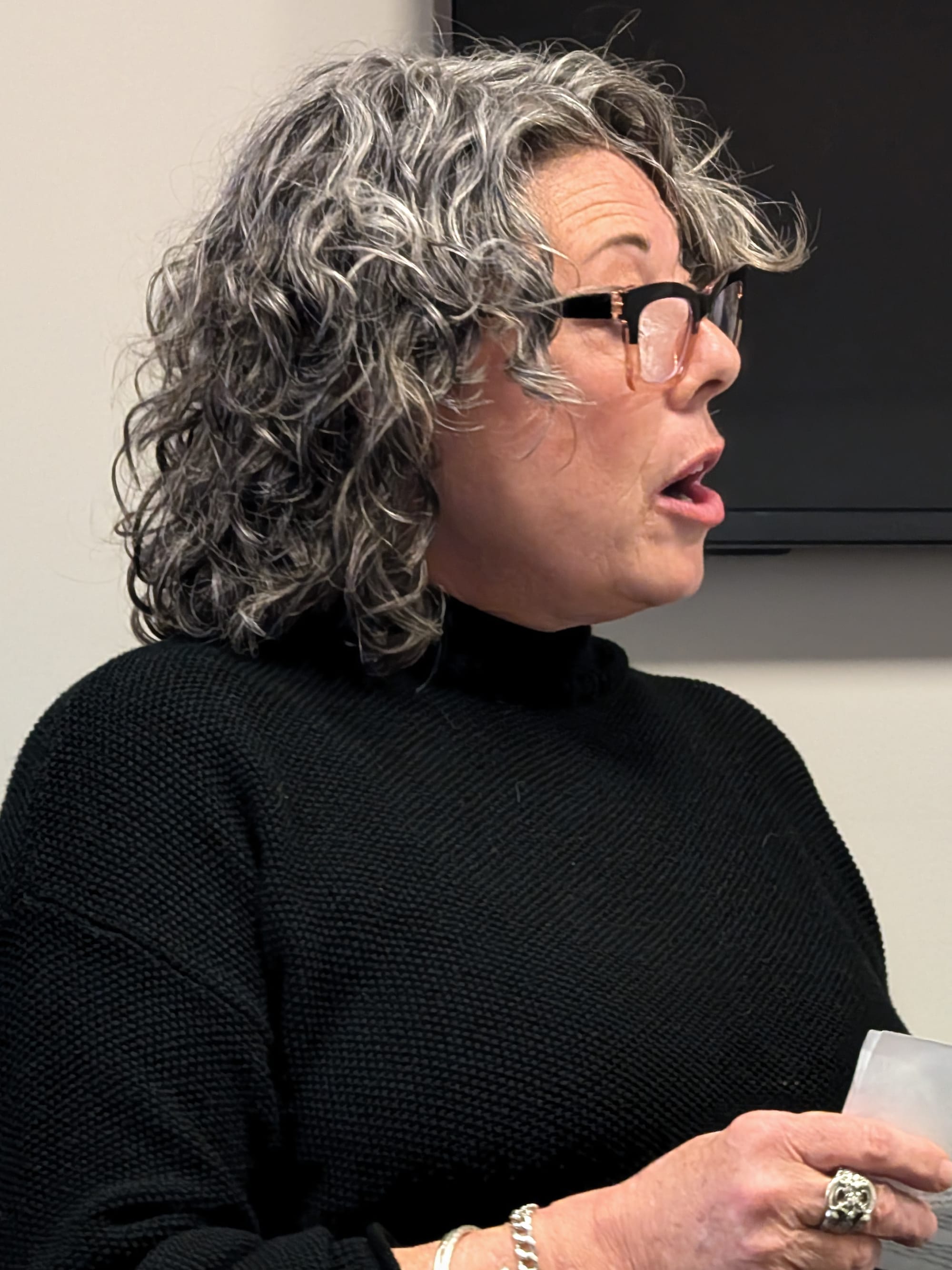
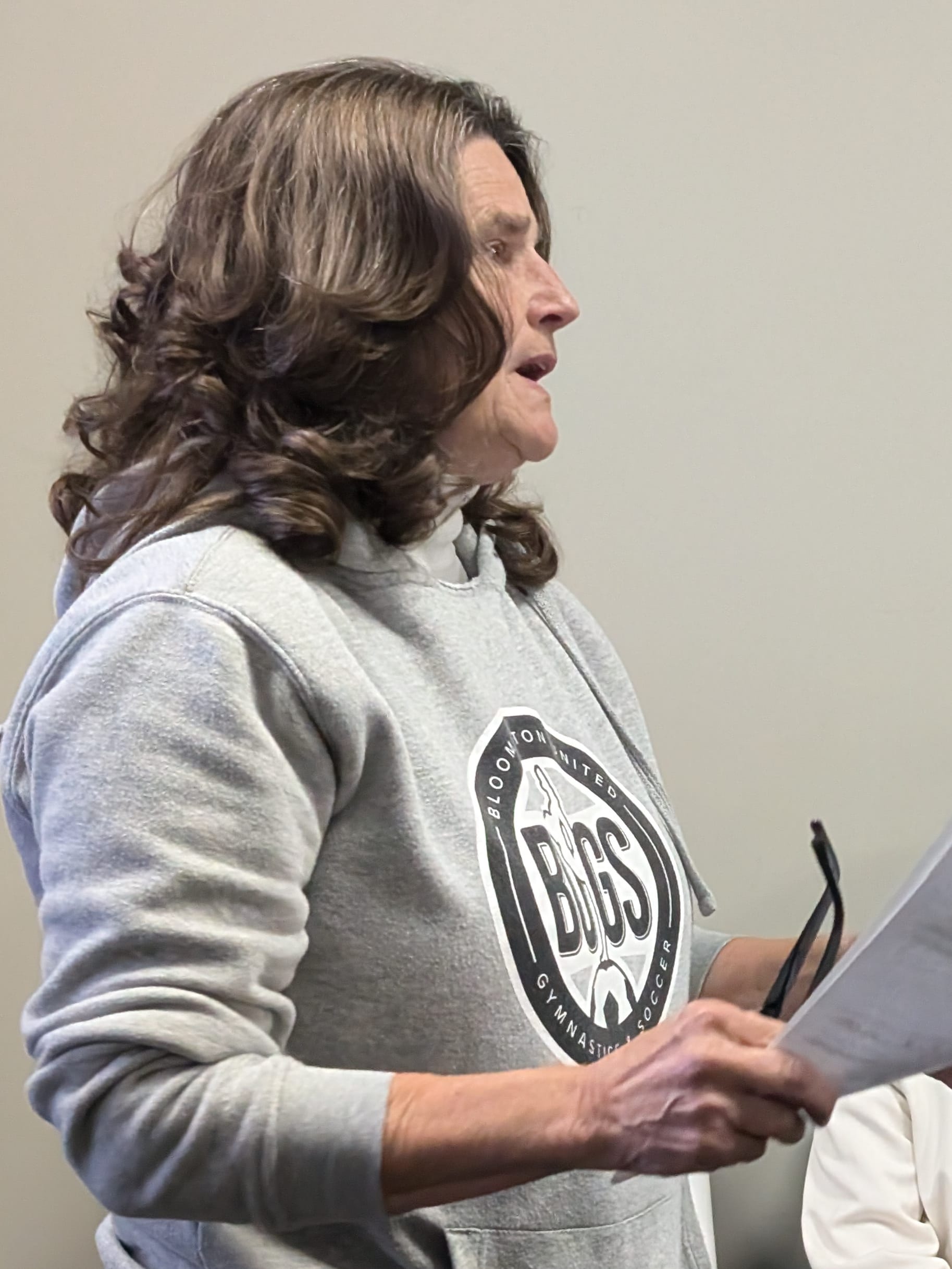
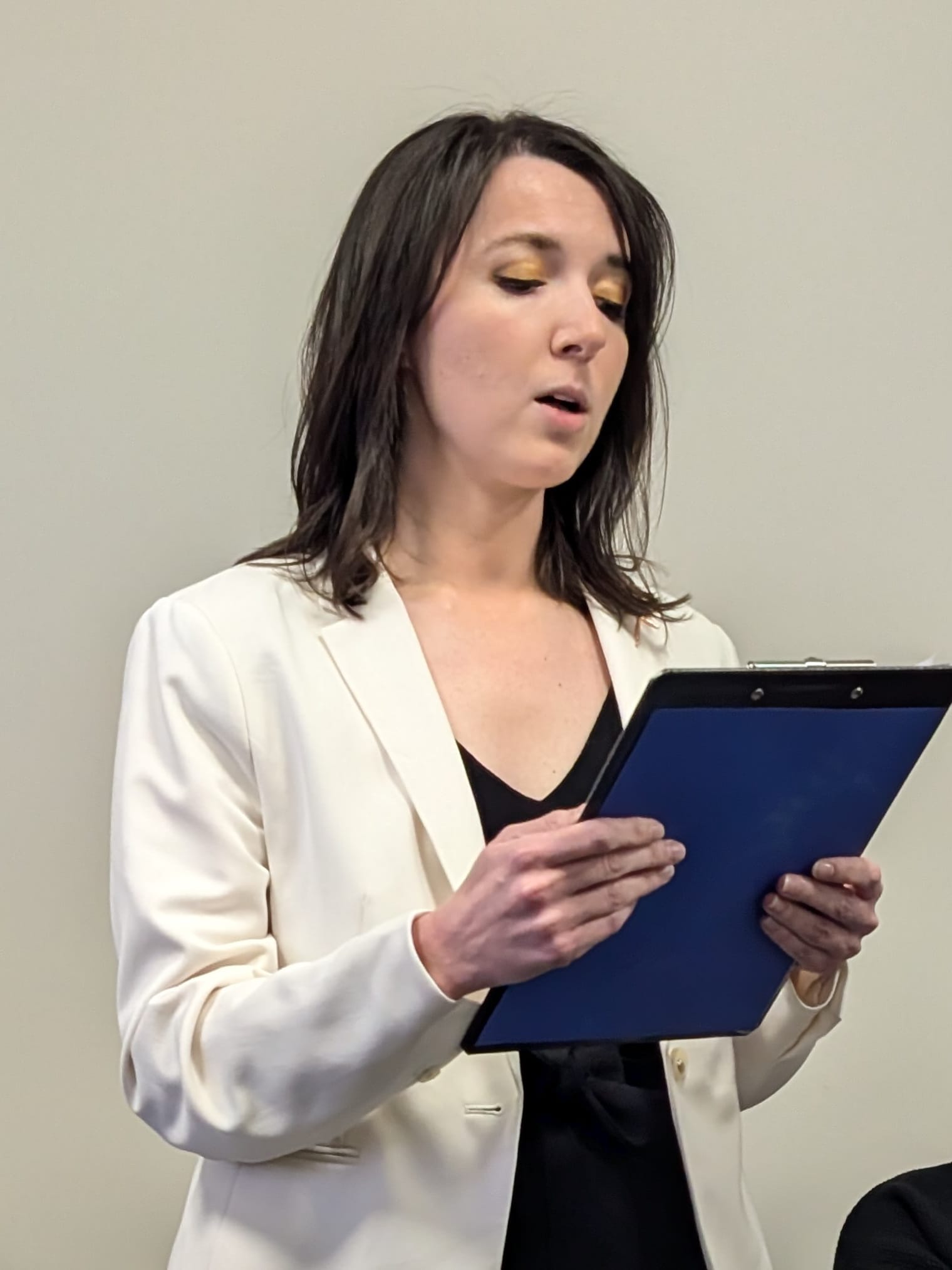
Left: Former Monroe County board of health member Ashley Cranor. Middle: Former Futures clinical assistant Debbie Deckard. Right: Former Futures Family Planning Clinic LPN Christine Brackenhoff. [meeting video] (April 17, 2025)
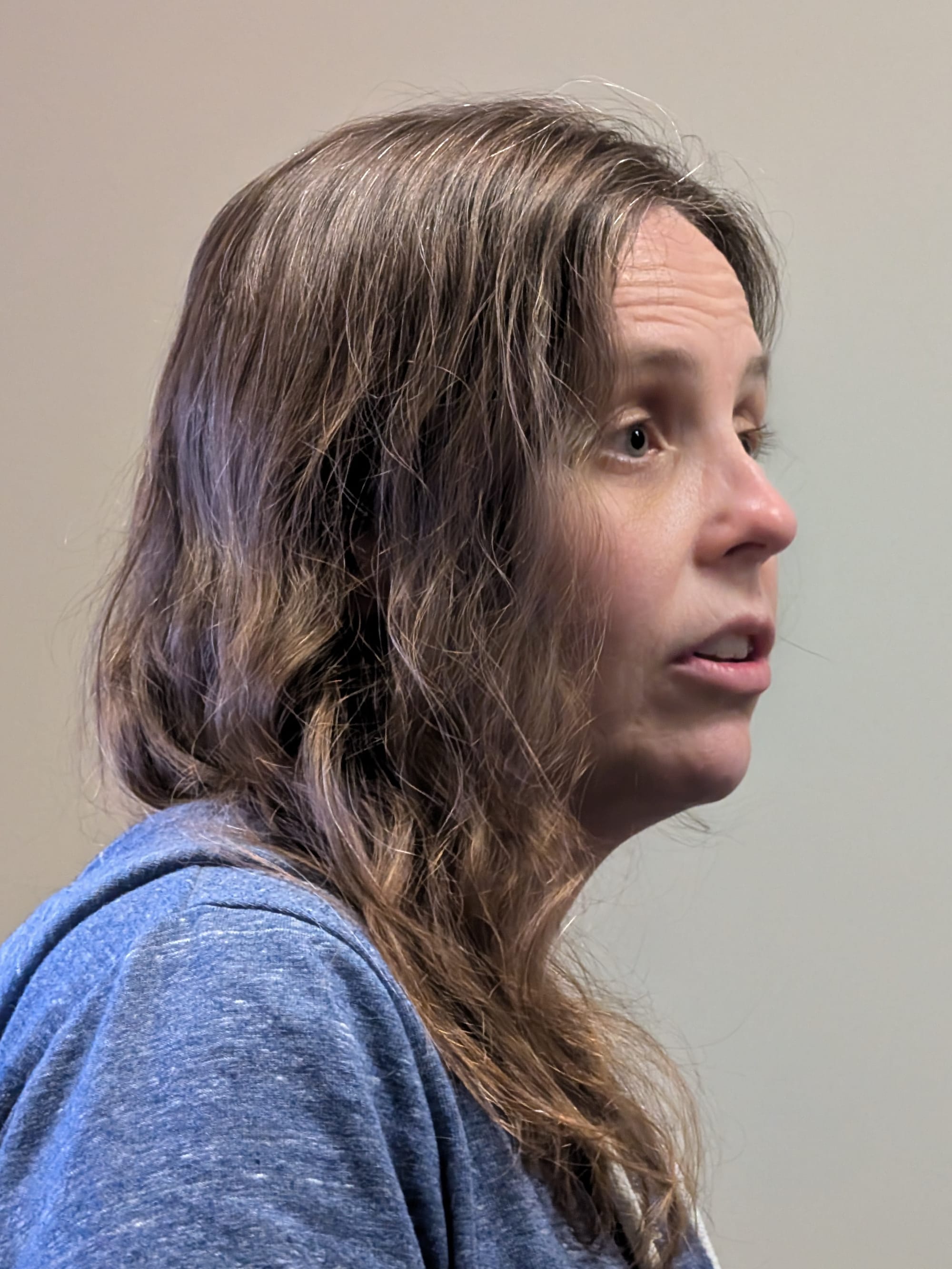
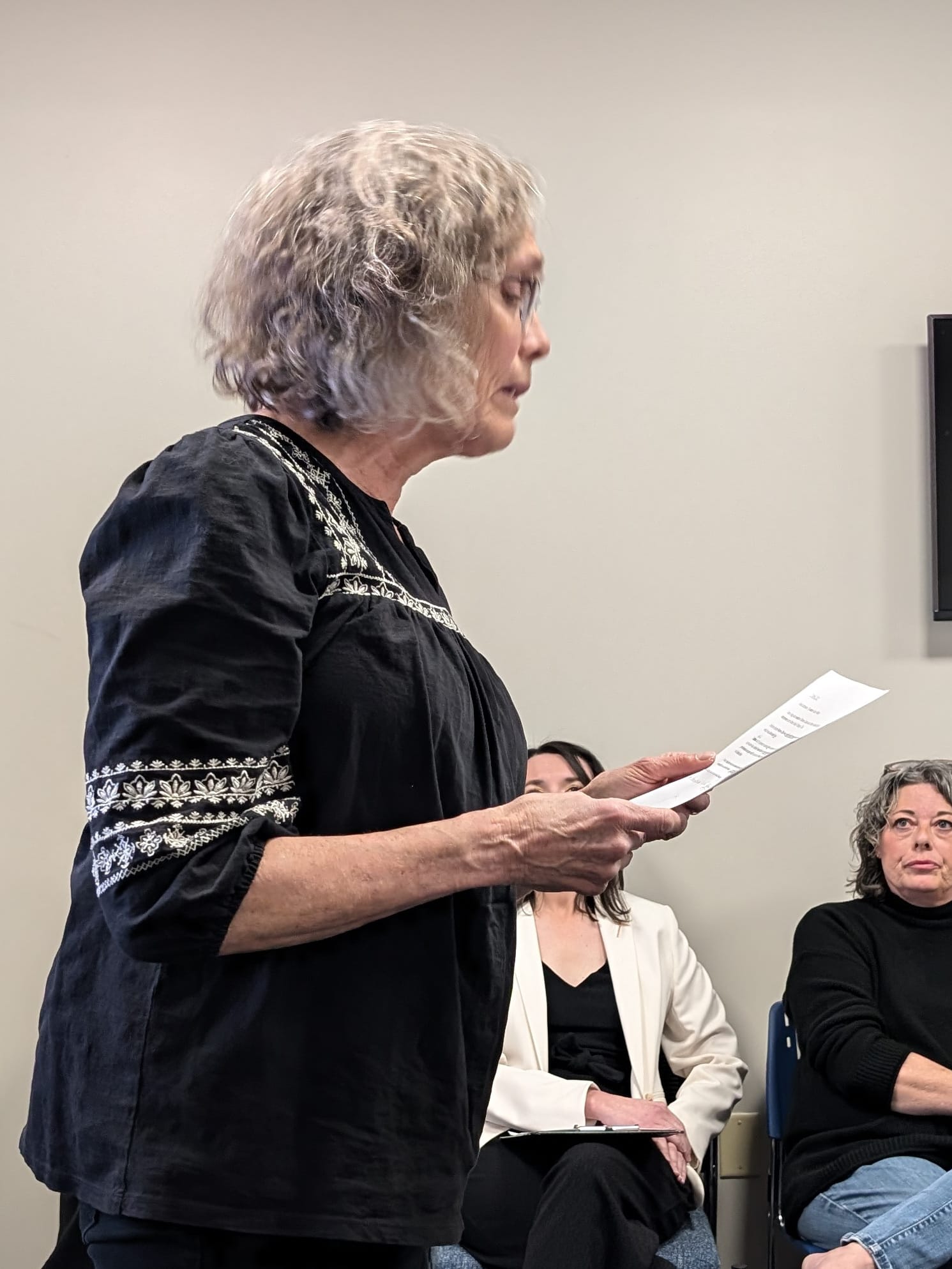
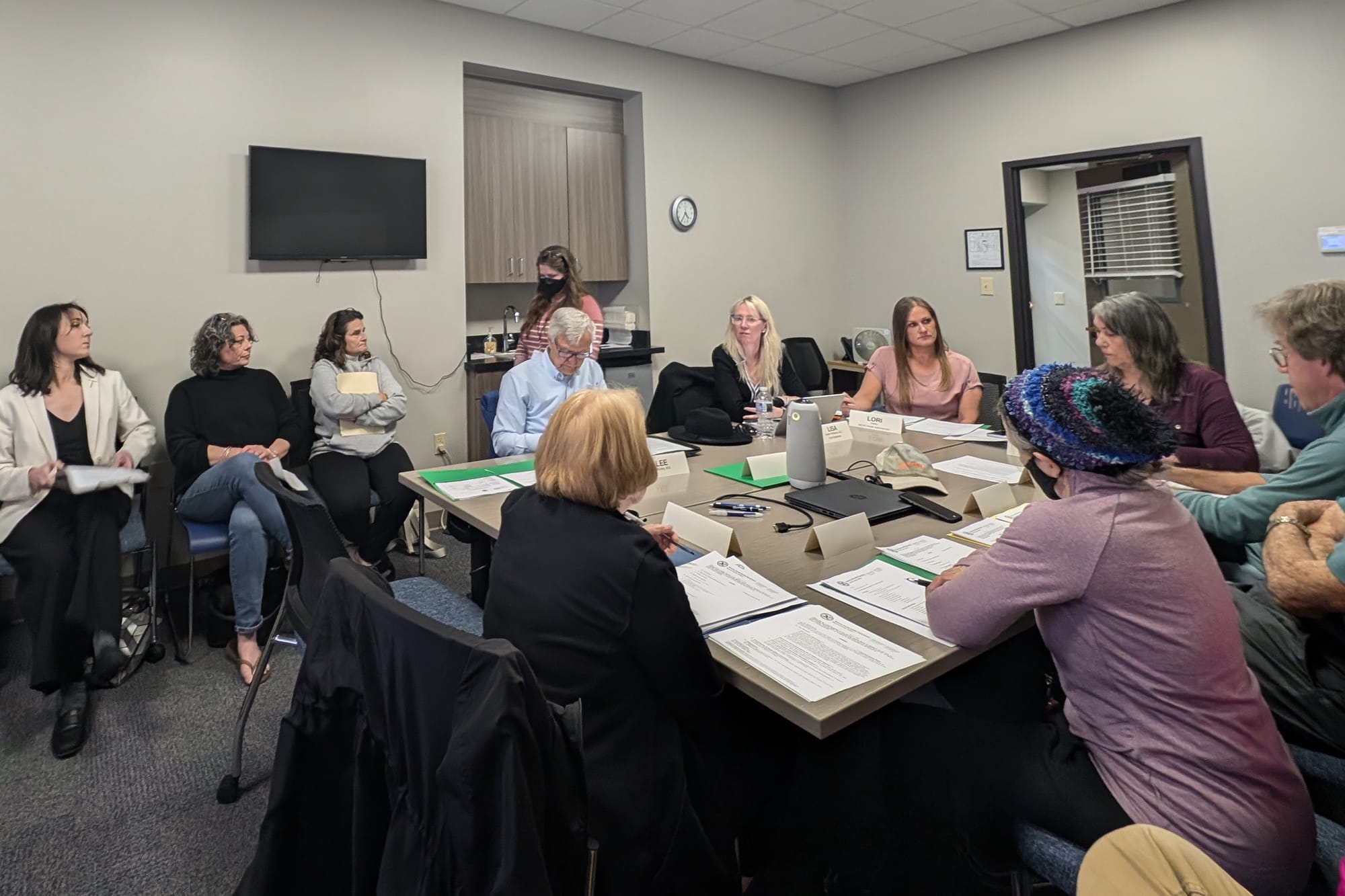
Left: Former Futures Clinic manager Chris Husted. Center: Former Futures Clinic translator Jane Walter. Right: Board of health members sit around the table as public commenters look on. [meeting video] (April 17, 2025)
Open House: Visits with employees
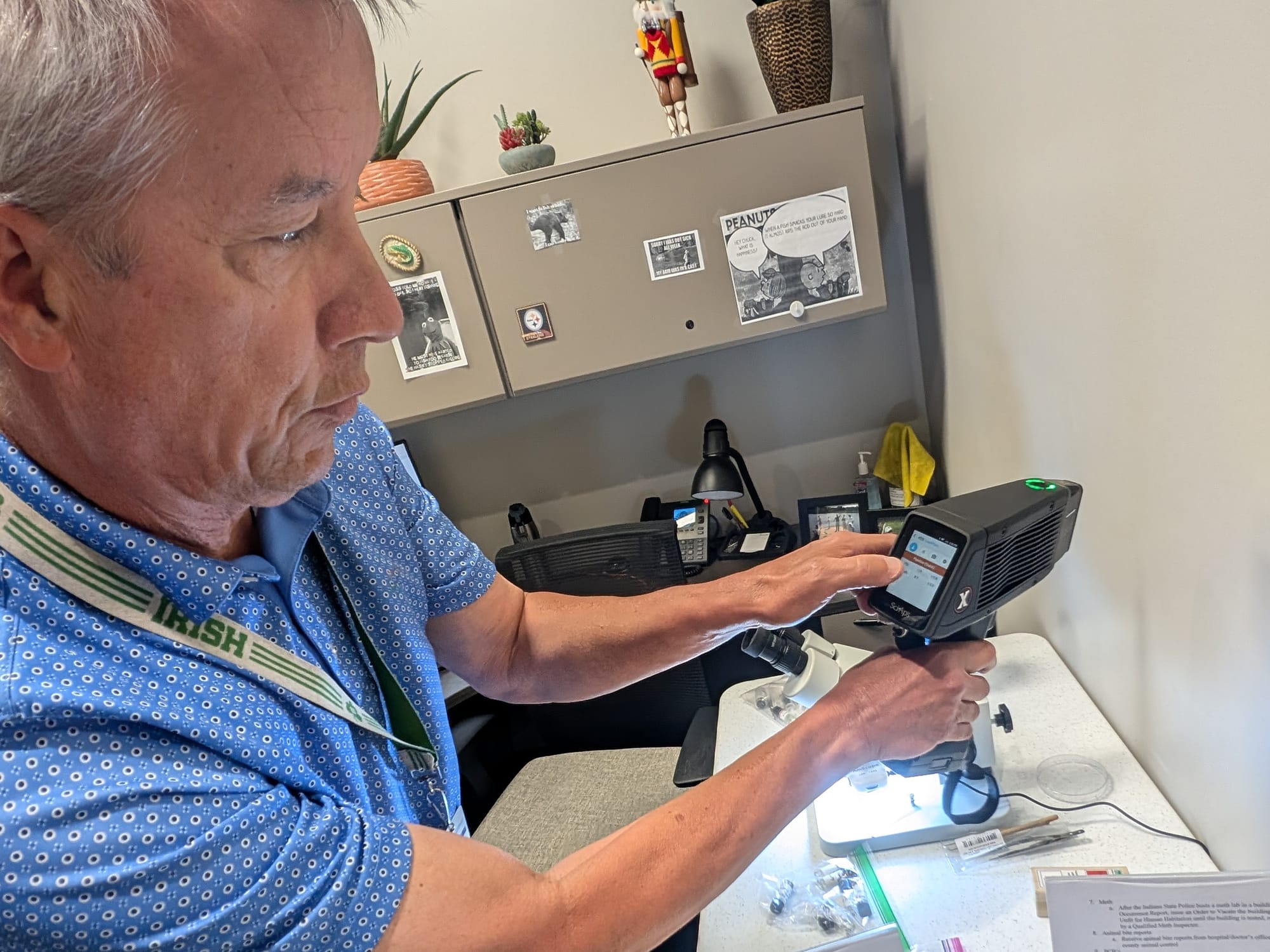
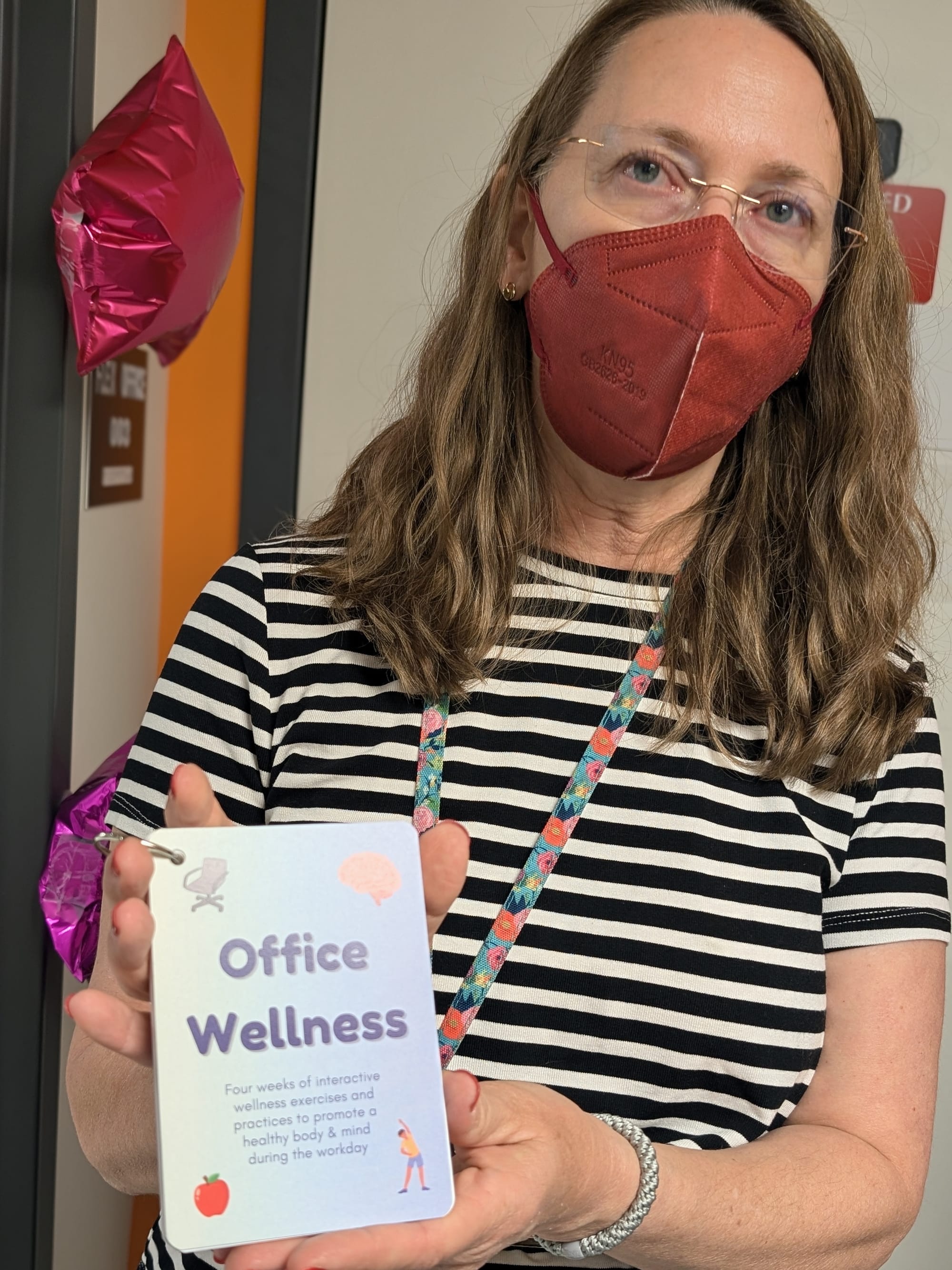
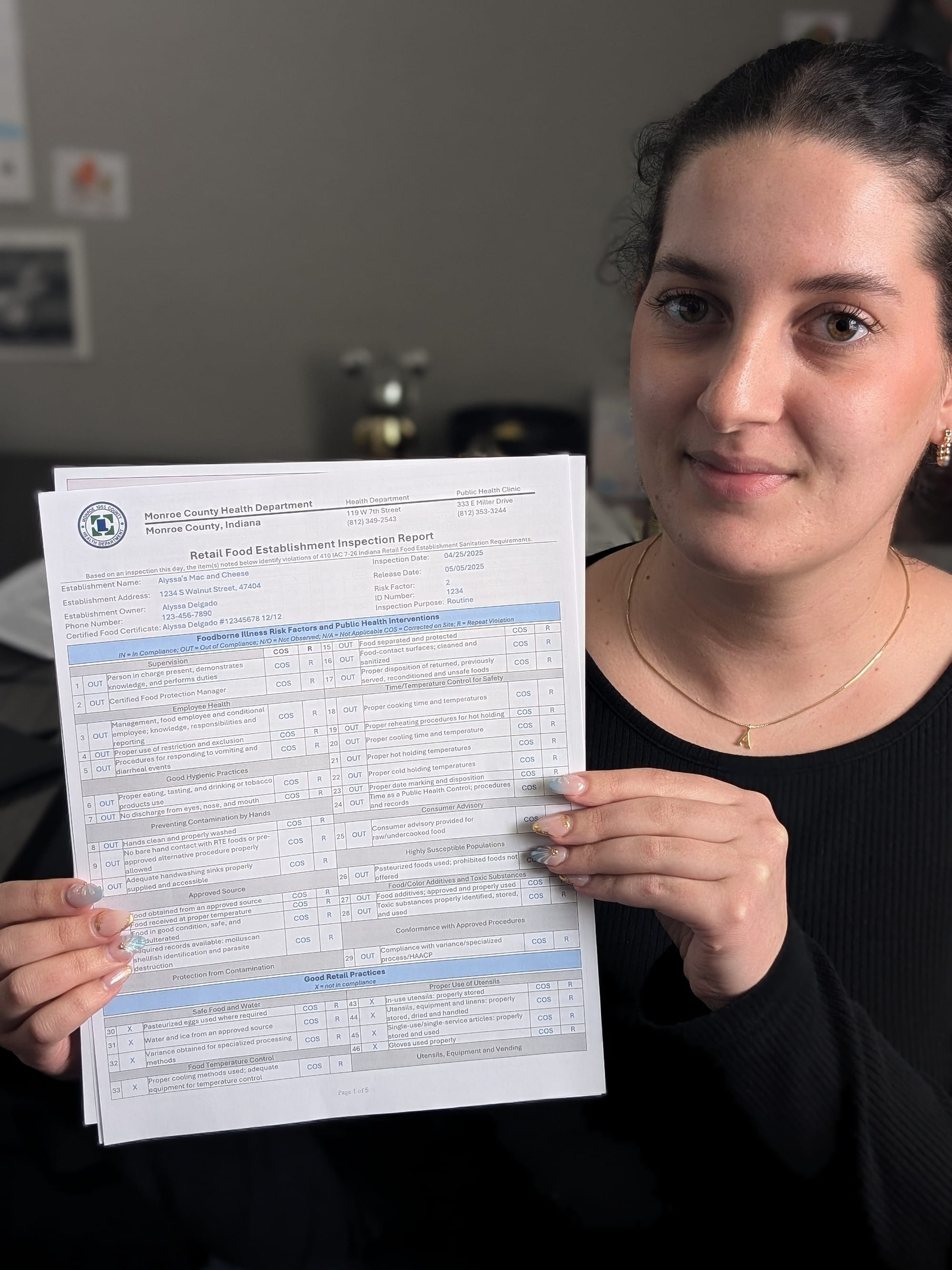
Left: Simeon Baker is an environmental health specialist who is demonstrating a lead testing gadget—which uses X-Ray Fluorescence (XRF) to determine the concentration of lead in paint. Center: Christina Kempf, who works in behavioral health, shows off a wellness guide. Right: Alyssa Delgado, who works in food inspection, shows off the printout from a tablet-based form she's building. (April 25, 2025)
During the open house tour of the health department building, The B Square visited several employees who seemed in good spirits, and appeared eager to talk about their jobs.
Christina Kempf, who works in behavioral health, described a project she'd worked on with an intern (Emma), to create a detailed wellness guide to remind employees to take care of their own physical and emotional well-being.
Alyssa Delgado works in food inspection—she was building a tablet-based report that inspectors can use onsite when they are inspecting a food establishment.
Miranda Ettinger and Matthew Allison are disease intervention specialists, who described testing for sexually transmitted diseases in a variety of locations like homeless encampments, bars, the Indiana University campus, and jails. They're willing to meet people wherever they are, they said.
Bryce Bookwalter is the department's public health preparedness coordinator, who described participating in seven exercises recently, including a statewide tabletop event. About his work to prepare for disasters and emergencies, Bookwalter said, "Hopefully you'll never see it."
The vital records staff described how they deal with documentation at the beginning of life (birth certificates) and the end of life (death certificates), but not in the middle—marriage is the purview of the county clerk's office. They described a range of phone calls that they field, including one that day from someone worried about the potential effect on their health from cell phone towers.
Simeon Baker is an environmental health specialist who demonstrated a lead testing gadget—which uses X-Ray Fluorescence (XRF) to determine the concentration of lead in paint. Baker expressed some frustration that people are reluctant to test their homes for lead, even though the Monroe County health department offers the service for free.
Open House: Board priorities

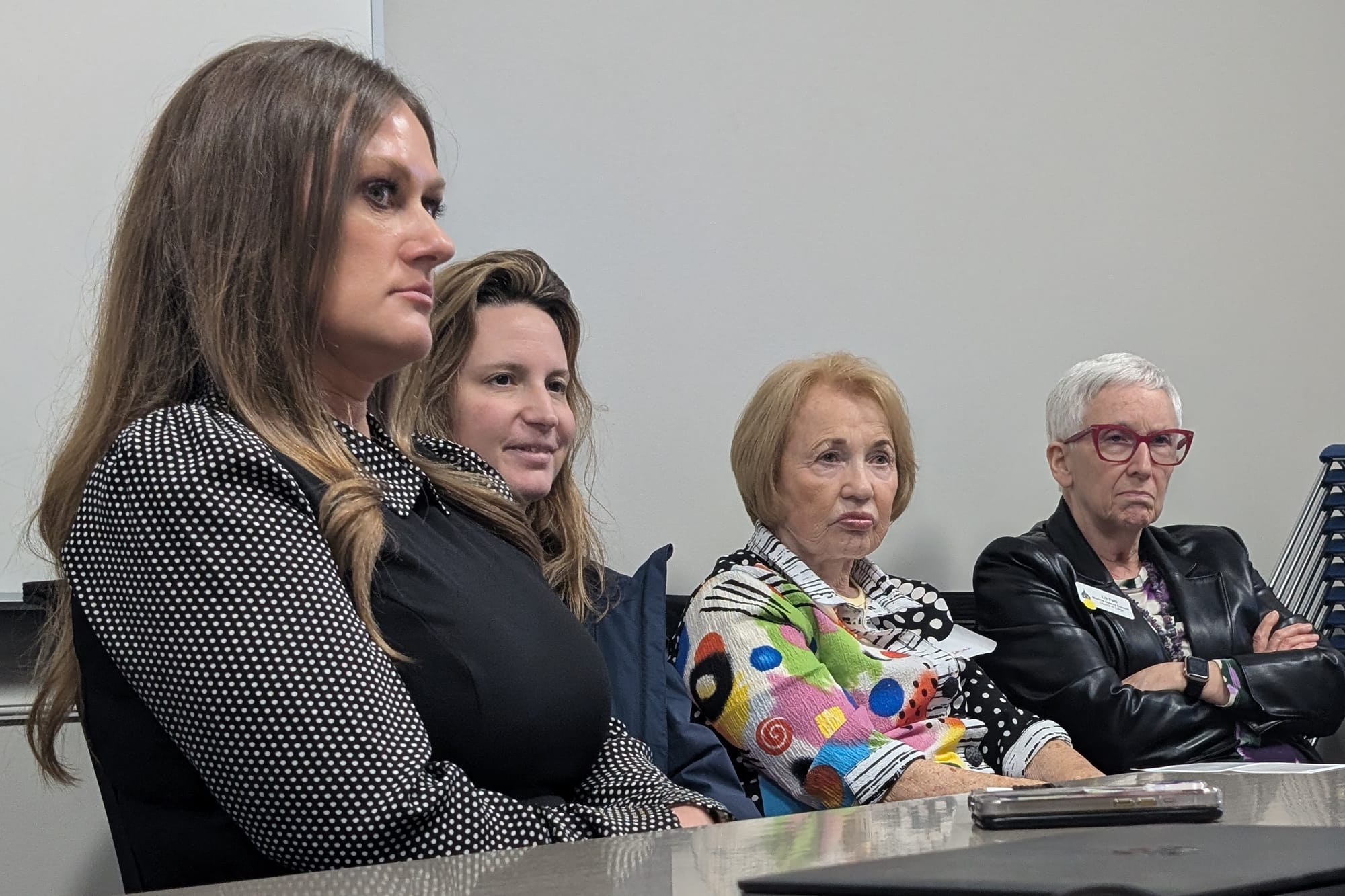
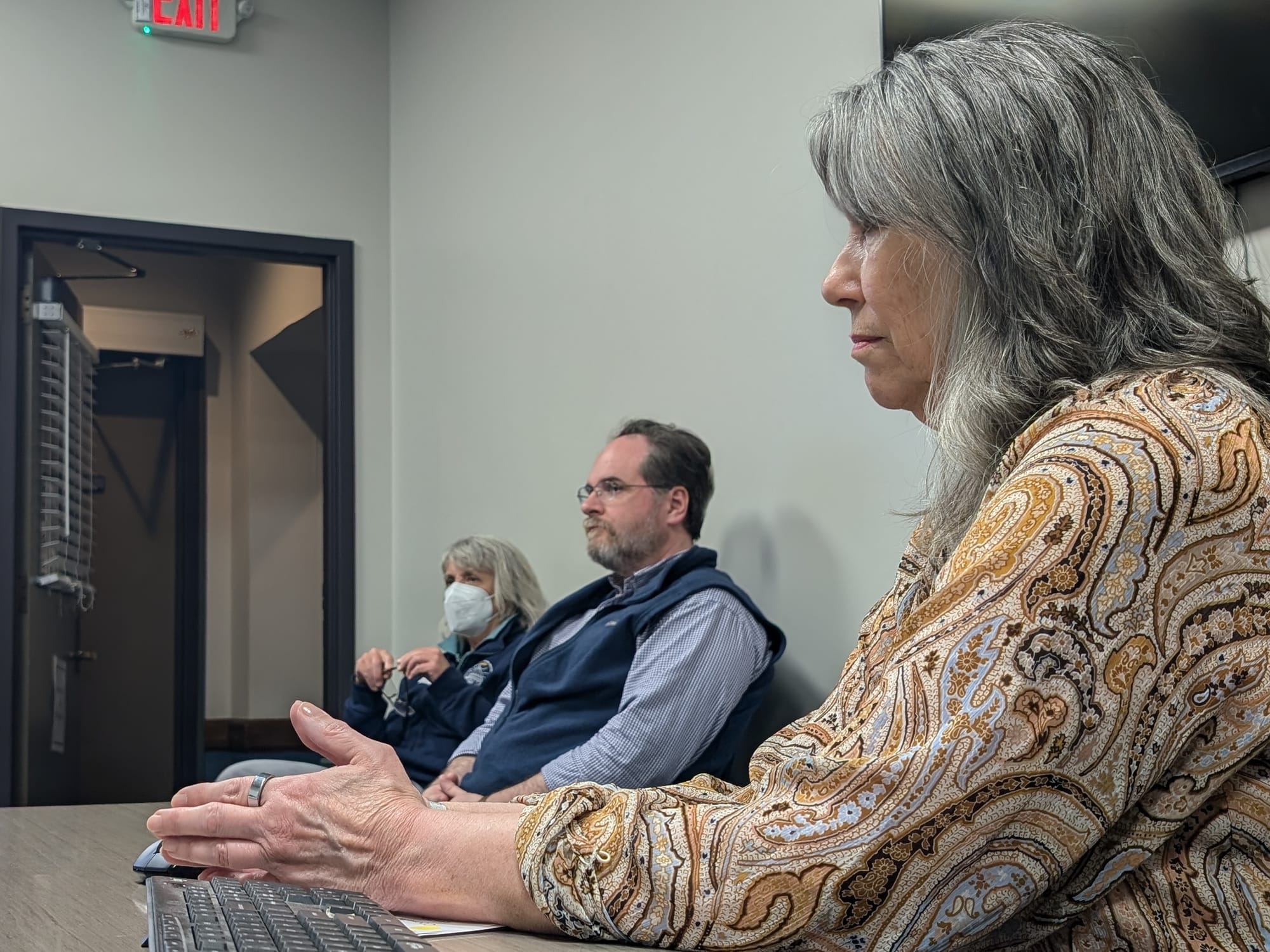
Left: Health board member Stephen Prichard. Center: From left are health administrator Lori Kelley, county commissioner Jody Madeira, health board member Kay Leach, and county councilor Liz Feitl. Right: From back to front are county commissioner Julie Thomas, county councilor David Henry, and health board president Dawne (Aurora) DiOrio. (April 25, 2025)
At the open house on Friday (April 25), health board president Dawne (Aurora) DiOrio gave a slide deck presentation that featured the board's current priorities and accomplishments of the department over the last year.
The board's priorities are chronic disease and vaccination. For chronic disease, the board wants to focus on reducing the impact of chronic illnesses like heart disease, diabetes, and obesity—through prevention, detection, and management. The board wants to expand access to vaccines in low-resource areas, educate people about vaccine safety and effectiveness, and address vaccine hesitancy to improve vaccination rates.
Among the department's accomplishments over the last year are expanded on-site primary care services to the unhoused through HealthNet and Wheeler Mission. Over the last year, Monroe County health department has expanded counseling and support services for those in recovery from addiction through Limelight Counseling, DiOrio said. DiOrio said the department has maintained support for mobile van services through Indiana Recovery Alliance. Finally, as an accomplishment over the last year, DiOrio listed a partnership with IDoH (Indiana Department of Health) and IUH (Indiana University Health) to expand vaccine delivery through a mobile van.


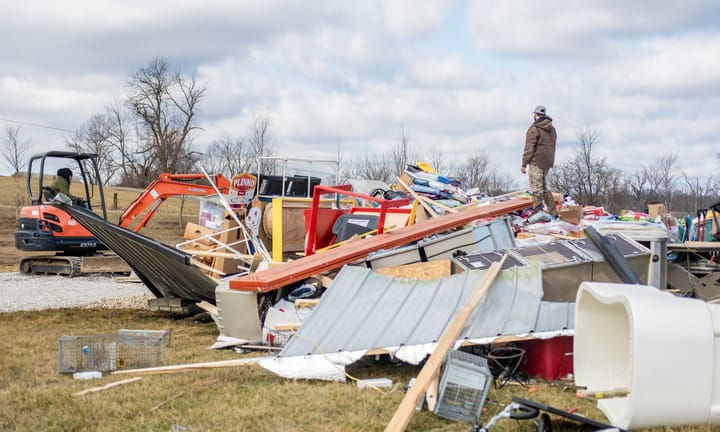
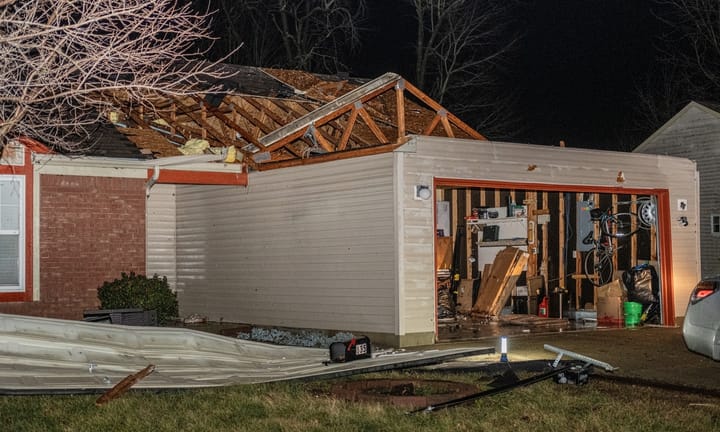
Comments ()